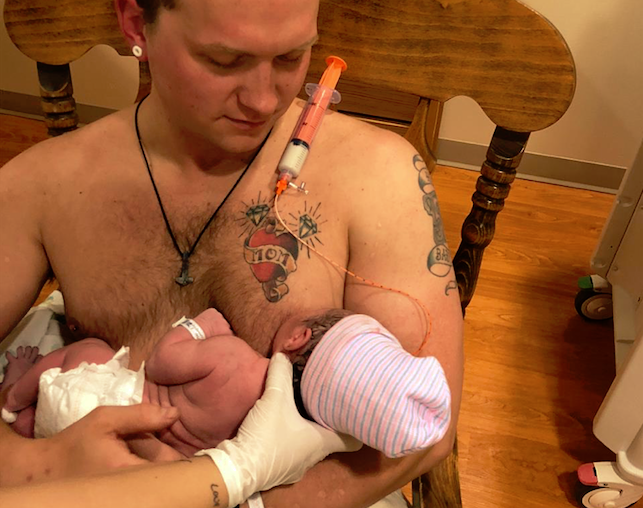Images of a father breastfeeding his newborn using an improvised nursing assistant device have spread like wildfire on social media.
Maxamillian Neubauer explained on Facebook that, due to emergency C-section complications, his wife was not able to breastfeed their baby. Their nurse then made a legendary proposal: that he place a fake nipple on his chest and feed his daughter milk through a special device (pictured above).
“Being the first to breast feed da baby!!!! I did it for the moms,” posted Neubauer along with his viral photo.
Read the full fascinating story here
Could this practice become widespread, leading insurers to cover male breastfeeding?
Breastfeeding is a way of offering babies a fantastic combination of nutrients and vitamins only contained in breast milk. But the act itself--the same position of a baby looking into their mother’s eyes while nursing--also creates a special bond.
Historically, fathers have been sidelined from this relationship, more witnesses than active participants. But this could change. Experts believe that in the near future, fathers might also be able to nurse their children and have that skin-to-skin contact (known as kangaroo care). What’s more, a device like Neubauer’s might come on the market--and could be covered by health insurance.
According to figures from the Centers for Disease Control and Prevention (CDC), breastfeeding rates in the United States are rising. Eight in every ten American mothers breastfeed their babies from birth. These data also show that babies are breastfeeding for longer: 55% of American babies born in 2014 were exclusively breastfed until 6 months, compared to 42% in 2004.
Despite this general upsurge, racial disparities persist. National estimates indicate substantially different rates between white and black babies, and so interventions are needed to specifically target breastfeeding barriers for black mothers.
The American Academy of Pediatrics recommends exclusive breastfeeding for the first six months of life.
Breastfeeding has been shown to have cognitive and health benefits both for babies and their mothers, according to WHO. This is especially important during the first six months of life, as it helps prevent diarrhea and pneumonia, two of the main causes of infant death.
